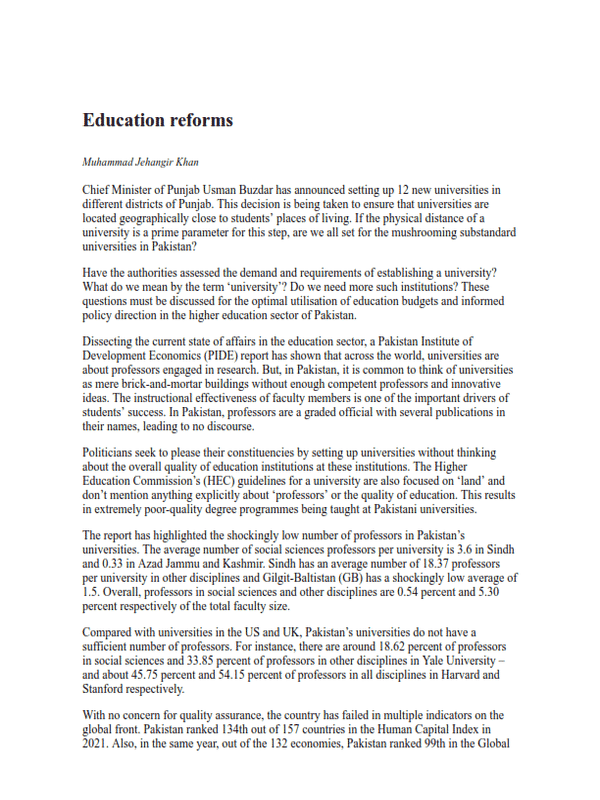
Pakistan Institute of Development Economics
- Home
Our Portals
MenuMenuMenuMenuMenuMenuMenu - ResearchMenuMenuMenuMenuMenuMenuMenu
- Discourse
- The PDR
- Our Researchers
- Academics
- Degree Verification
- Thesis Portal
- Our Portals
Education reforms
Chief Minister of Punjab Usman Buzdar has announced setting up 12 new universities in different districts of Punjab. This decision is being taken to ensure that universities are located geographically close to students’ places of living. If the physical distance of a university is a prime parameter for this step, are we all set for the mushrooming substandard universities in Pakistan?
Have the authorities assessed the demand and requirements of establishing a university? What do we mean by the term ‘university’? Do we need more such institutions? These questions must be discussed for the optimal utilisation of education budgets and informed policy direction in the higher education sector of Pakistan.
Dissecting the current state of affairs in the education sector, a Pakistan Institute of Development Economics (PIDE) report has shown that across the world, universities are about professors engaged in research. But, in Pakistan, it is common to think of universities as mere brick-and-mortar buildings without enough competent professors and innovative ideas. The instructional effectiveness of faculty members is one of the important drivers of students’ success. In Pakistan, professors are a graded official with several publications in their names, leading to no discourse.
Politicians seek to please their constituencies by setting up universities without thinking about the overall quality of education institutions at these institutions. The Higher Education Commission’s (HEC) guidelines for a university are also focused on ‘land’ and don’t mention anything explicitly about ‘professors’ or the quality of education. This results in extremely poor-quality degree programmes being taught at Pakistani universities.
The report has highlighted the shockingly low number of professors in Pakistan’s universities. The average number of social sciences professors per university is 3.6 in Sindh and 0.33 in Azad Jammu and Kashmir. Sindh has an average number of 18.37 professors per university in other disciplines and Gilgit-Baltistan (GB) has a shockingly low average of 1.5. Overall, professors in social sciences and other disciplines are 0.54 percent and 5.30 percent respectively of the total faculty size.
Compared with universities in the US and UK, Pakistan’s universities do not have a sufficient number of professors. For instance, there are around 18.62 percent of professors in social sciences and 33.85 percent of professors in other disciplines in Yale University – and about 45.75 percent and 54.15 percent of professors in all disciplines in Harvard and Stanford respectively.
With no concern for quality assurance, the country has failed in multiple indicators on the global front. Pakistan ranked 134th out of 157 countries in the Human Capital Index in 2021. Also, in the same year, out of the 132 economies, Pakistan ranked 99th in the Global Innovation Index – a rank which indicates the country’s low literacy rate and lack of significant investment in innovation in the form of research and development and education, with the weakest performance in human capital, research, and market sophistication. This shows that instead of focusing on improving the quality of higher education, we are churning out large numbers of incompetent students who are ill-prepared for market needs.
To revolutionise the landscape of the country’s higher education sector, there is an urgent need to shift the policy’s focus away from mere ‘brick and mortar’ to grooming professors. The PSDP should allocate more funds for the training and financing of professors. Also, given the high failure and dropout rates, human capital flight, and emitted peer review, HEC scholarships are an inefficient way of nurturing professors. And since publications and PhD quality standards are loosely defined, quality assurance is limited. It is also quite important to jumpstart our 231 universities.
Perhaps a better approach might be to develop a large-scale professor hiring programme. Under such an initiative, foreign professors must be hired at competitive salary packages to spend time in Pakistani universities. The HEC’s current foreign faculty programme didn’t succeed in meeting the desired results. The process of such programmes needs to be worked out and carefully monitored.
We should also begin a professor development programme, which should be carefully spread through leading universities and used to develop professional associations that should form the foundation of our peer review and academic discourse.
The writer is an assistant professor at the Pakistan Institute of Development Economics (PIDE) and can be reached at: [email protected]



